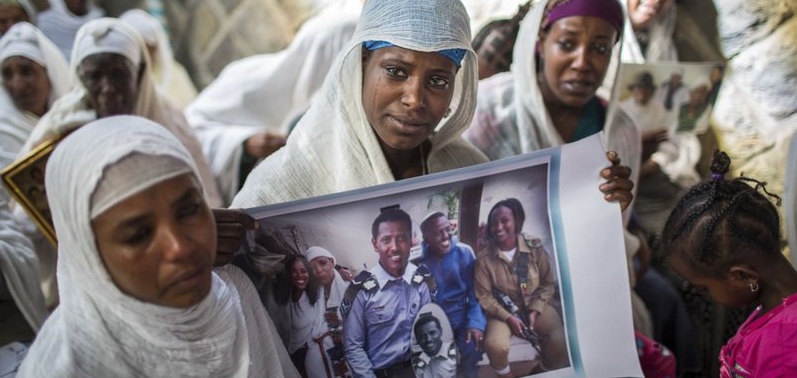Alwaght- The Israeli regime announced on 17 September that it agreed to absorb 1,000 Ethiopian Jews, raising to the surface the issues of the African Jews immigration to the occupied Palestine, their living conditions, and views to these African Jews.
The first black Jews’ contacts to the Zionist communities dates back to the 1880s, the decade the Zionist Organization held its meetings to prompt foundation of a Jewish state in the Palestinian territories. After announcing the Israeli regime the black Jews were transferred to the occupied territories with American tourist visas. The second group of blacks migrated to the Israeli regime between 1969 and 1970.
Occupied palestine is home to approximately 144,000 Jews of Ethiopian descent, the majority of whom immigrated to Israel in the 1980s and 1990s. Last year Israeli regime transferred some 1,300 Ethiopians with relatives who had already immigrated.
In the beginning, they failed to receive a warm welcome by the newly-founded Israeli community, as the Orthodox rabbis rejected their claim of being genuine Jews. These Ethiopians are descendants of Ethiopian Jews who were forcibly converted to Christianity around a century ago.
As a result of this social rejection, they were settled in the Dimona, a region in the desert part of the occupied territories deprived of ordinary services.
The African-Americans were not the only black people to migrate to the Israeli regime. The blacks from the African states also were part of the migrants, known as Falasha Jews. They linked themselves to Queen Bilqis of Sheba, claiming that they have bonds to Prophet David (also known by the Jews as King David). But their roots did not throw them under the tradition Israeli ethnic categorizations including the Ashkenazi Jews of Western Europe and Sephardi Jews of the East, something made the ordinary Israelis do not recognize them as Jews. The Israeli leaders, whoever, took no steps to deport them to their countries.
Now that the Israeli regime is facing reverse migration amid ongoing crises in the region, admission of new African Jewish communities can help prevent a drop in the Israeli population.
According to polls conducted after three key Israeli 33-Day, 22-Day, and 51-Day Wars in 2006, 2008, and 2014 against Lebanon and Gaza, of 10 migrants in the Israeli regime 6 considered return to their home countries. These figure, the analysts suggest, are higher now as Tel Aviv faces real security threats as its opponents in the Axis of Resistance are winning the war against terrorism in Syria and Iraq and Hezbollah of Lebanon has won the May parliamentary election and will have a strong presence in the Lebanese cabinet. Reacting to the looming risks, the Israeli regime is taking in migrants from the African countries and also Jews of war-hit nations like Yemen.
But the Tel Aviv leaders not only seek absorbing African Jews to the occupied territories, but also exploit the sporadic violence and threats against the Jews in Europe and risks of the rise of anti-Semitic movements in such countries as Germany in a bid to persuade the Western Jews to settle in the Israeli regime. This policy targets two aims: Preventing fall in the Israeli population and justifying the new settlement projects.
This policy took the Israeli strategists in the recent years to settle the Falasha and Eastern Jews, from Russia and Eastern Europe countries, in the insecure settlements near Gaza Strip, West Bank, and the occupied Golan Heights.
Settling the African Jews in the settlements serves an Israeli human shield, beside tightening the Tel Aviv grip on the occupied lands. So, the Israeli leaders hit a big target of filling the settlements by persuading the African Jews who ordinarily live under poverty, violence, and famine in their home countries.
Tel Aviv also has other advantages in taking in the African Jews. Once they are granted citizenship, they can provide troops to the army. According to the Israeli law, all of the Israeli Jews above 18, male and female, should serve in the military. At the present time, the males serve two years and eight months and the females serve two full years. But the Haredi Jews, also known as “Ultra-Orthodox Jews” are exempted from military conscription. With regard to their big population, their exemption, some insider circles warn, can make the army face soldiers shortage in the next decade. The Ultra-Orthodox Jews now account for 10 percent of the Israeli 9 million population. Due to their tendency the Haredi families to have children, the statistics predict their population to account for 29 percent by 2050. If the Israeli leaders decline to make an effort to repel the upcoming challenge, in the near future Tel Aviv will have to grapple with several troubles amid increasing security threats. But the leaders may find it hard to change the law to take the Heredis into the military as the rightists strengthen their power in the politics. The best resort for now is the admission of Jews from poverty and war-hit regions.
But the discrimination against the blacks by the regime in terms of employment, housing, and social services cannot be hidden. The discriminatory approach towards them, the analysts note, will prevent from their integration into the Israeli society. As the blacks launched protest movements in the US against the discrimination, similar movements are expected to be initiated by the black Jews of the Israeli regime in the upcoming decades.
Potentials of black protest movements are foreseen while the Israeli society is now facing gaps as a result of discrimination between the Sephardi and Ashkenazi Jews and secular and Ultra-Orthodox Jews. Addition of a new component to the already fragile Israeli community can make ground for huge identity crises in the Israeli future.



























